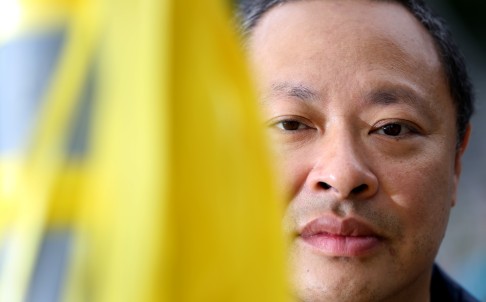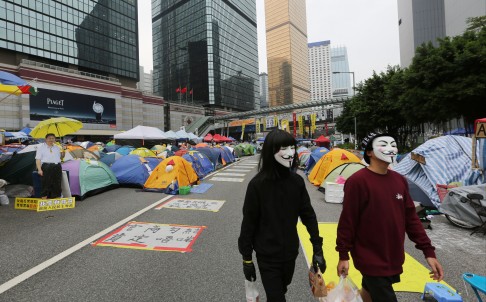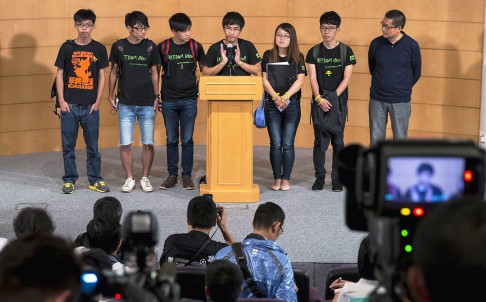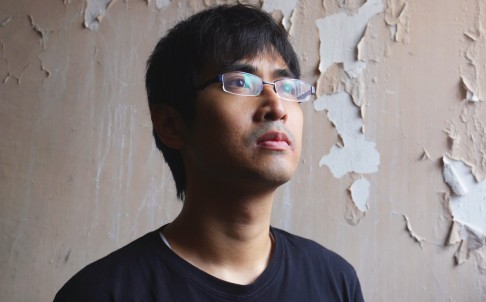Occupy Central
Occupy Central is a civil disobedience movement which began in Hong Kong on September 28, 2014. It calls on thousands of protesters to block roads and paralyse Hong Kong's financial district if the Beijing and Hong Kong governments do not agree to implement universal suffrage for the chief executive election in 2017 and the Legislative Council elections in 2020 according to "international standards." The movement was initiated by Benny Tai Yiu-ting, an associate professor of law at the University of Hong Kong, in January 2013.
OCCUPY CENTRAL - DAY 38: Full coverage of the day’s events
PUBLISHED : Tuesday, 04 November, 2014, 5:27am
Hong Kong protest calls are becoming ever more bizarre
Benny Tai said Leung should dismiss the entire legislature if the voting reform framework handed down by Beijing failed to pass in Legco.
Occupy protesters started off winning massive public and international sympathy. But now, with no real policy alternatives or endgame in sight, their demands have become increasingly bizarre. These include trying to get everyone to resign.
Initially, they wanted Chief Executive Leung "The Wolf" Chun-ying's head. Fair enough, as the buck stops with him. Over the past month, I was told by two members of the Executive Council that protesters had asked more than half a dozen Exco members to quit, either because they were perceived as too pro-Beijing, not doing their job or to show they supported democracy. Not content with just the enemies resigning, the student leaders now call on fellow pan-democrats in the legislature to resign in order to trigger a "referendum".
The idea, according to Alex Chow Yong-kang, secretary general of the Hong Kong Federation of Students, is that a mass resignation by pan-democrat lawmakers would prompt a by-election, which in turn would serve as a platform for people to express their views on the constitutional reform package yet to be proposed by the government for the 2016 and 2017 elections.
Not to be outdone, Occupy co-founder Benny Tai Yiu-ting said Leung should dismiss the entire legislature if the voting reform framework handed down by Beijing failed to pass in Legco. Tai's idea, presumably, is that after all the lawmakers are dismissed, Leung would fall on his own sword. Tai and the student leaders have said repeatedly that Leung's resignation is one way to send Occupy protesters home.
I have never understood why resigning from Legco and getting elected again amounts to a referendum vote. The act itself proves nothing other than that you have enough voters willing to send you back to Legco repeatedly. Don't referendums usually involve well-defined questions to be voted on by the entire electorate? There is also the small matter that, according to a recent HKU survey, some pan-dem lawmakers have hit rock-bottom in their approval ratings in the past two decades so they might not be voted back.
Do people like Tai and Chow really want to empty our legislative and executive branches so no one is left to do the work? That would be beyond gridlock.
This article appeared in the South China Morning Post print edition as Protest calls getting ever more bizarre
Occupation of streets by force undemocratic illegal and uncivilised
PUBLISHED : Tuesday, 04 November, 2014, 5:27am
Pro-democracy protesters gather at protest site in Admiralty during "Occupy Central with Love and Peace" (OCLP) movement.
During my nine years in Hong Kong, I have appreciated and respected this vibrant international city where innovation and entrepreneurship thrive within the framework of the rule of law and a civilised society.
But the recent occupation of roadways by protesters has brought great concern. The occupation of streets by force is illegal, uncivilised and undemocratic - and should cease immediately.
The protesters clearly believe strongly in their views, but do not believe in the rule of law and do not believe in democracy. They are a small minority forcing their will upon others.
The thousands who have been significantly inconvenienced never gave their permission to have the roadways blocked.
There was no vote of the people who live and work in the areas affected, giving their agreement to close roads. The protesters took the roads by force, imposing their views upon the rights of many others.
The underlying issues in the current situation are complex and important. But the protesters essentially support an uncivilised, undemocratic principle of governance: policies should be determined, according to the protesters, by views of a small minority who have strong opinions and are prepared to act as mobs of people. Some 70,000 people may be able to occupy key roadways, but comprise only 1 per cent of the population.
The underlying principle of the protesters is that when 1 per cent of the people feel strongly about a topic, they should be allowed to close key roadways, interfering with the daily lives and rights of the other 99 per cent, and the government should follow the dictates of the mob. That is certainly not legal, or civilised, or democratic.
Hong Kong will have a better future in many ways if it acts firmly to protect its rule of law and its civilised society. The government could make it clear that parks can be available for assembly to express views, and that it will give serious attention to petitions properly signed by large numbers of Hongkongers, without infringement on the rights of others. The city could assure that all necessary actions are taken promptly, in accordance with the law, to open all roadways and pavements that have been taken by force.
Hong Kong can make it clear that it is prepared to seriously consider alternative views on issues, but its policies will not be determined by crowds acting in violation of the law, impinging on the rights of others.
Frank Newman, Mid-Levels
This article appeared in the South China Morning Post print edition as Occupation of streets undemocratic, illegal and uncivilised
Federation of Students now Hong Kong’s most popular political group, poll finds
PUBLISHED : Tuesday, 04 November, 2014, 5:18pm
Members of the Federation of Students and Scholarism address the media after talks with the government last month. Photo: Reuters
The Federation of Students is the city's most popular and best-known political group, according to a University of Hong Kong poll carried out amid pro-democracy street protests that the federation has been leading.
The poll, conducted from October 20 to 23, found 89.2 per cent of 1,013 people knew of the group and gave it an average support rating of 47.7 points out of 100.
But in a poll by Polytechnic University, nearly three-quarters of respondents felt that now was the right time to stop the civil disobedience action. Nearly half wanted the campaign to end because they said it had affected the economy and livelihoods.
The prolonged protests have apparently dragged down the pan-democratic and pro-establishment camps, with every political group except the federation recording drops in popularity in the HKU poll.
"All political groups have become losers in the Occupy movement," said Dr Robert Chung Ting-yiu, head of the HKU public opinion programme.
The federation's poll showing was remarkable, considering it had never ranked among the 12 most recognised political groups before - and so had never had its popularity rated.
Federation leaders took part in televised talks with government officials in an attempt to resolve the protest stalemate.
Chung said the public ought to review significant events of the past months and "make their own judgments" about the federation's surge in recognition.
The Beijing-friendly Federation of Trade Unions was the second most popular group, despite dropping 8.2 points to 42.6.
The pan-democratic Civic Party, Democratic Party and Labour Party fell the most in support ratings, dropping by around 9 points. The Democrats, Civic Party and Confederation of Trade Unions as well as the pro-establishment FTU and Democratic Alliance for the Betterment and Progress of Hong Kong all recorded their lowest ever poll ratings.
In PolyU's poll, carried out last weekend, more than a third of the 554 respondents said Chief Executive Leung Chun-ying and his ministers should be responsible for the prolonged protests.
The HKU poll on the support ratings has a margin of error of plus or minus 2.8 points, while the one for the PolyU poll is plus or minus 4.16 percentage points.
This article appeared in the South China Morning Post print edition as A new political order - student group tops HKU poll
Hong Kong student group says will send delegation to Beijing to seek talks
They want Hong Kong deputies to help arrange a meeting during Apec summit
PUBLISHED : Tuesday, 04 November, 2014, 10:49pm
Alex Chow hopes for help to set up a meeting. Photo: Dickson Lee
The Hong Kong Federation of Students has decided to send representatives to Beijing during the Asia-Pacific Economic Cooperation summit in the hope of conveying its demands for genuine universal suffrage directly to top officials.
It plans to seek help from local deputies to the national legislature and the top national advisory body to arrange a meeting in the capital.
Federation activist Tommy Cheung Sau-yin said they had yet to decide who would go to Beijing or when they would go.
Fellow student leader Nathan Law Kwun-chung said they understood some people objected to the idea, but asked for their support and understanding.
"The trip is neither a show nor a reckless decision," Law said. They had consulted experts who were familiar with mainland affairs.
"It is hard to have a breakthrough under the current framework. This is why we have come up with the idea of a Beijing trip," he said.
Earlier, Alex Chow Yong-kang, secretary general of the federation, said they would write to local deputies to the National People's Congress and the Chinese People's Political Consultative Conference today, asking if they could line up a meeting.
Meanwhile, activists from mainland China, Taiwan, Hong Kong and Macau are planning a joint protest against Japanese Prime Minister Shinzo Abe's presence at the summit. Zhang Likun, a member of the China Federation for Defending the Diaoyu Islands, said the idea was to protest outside the Japanese embassy in Beijing.
Zhang said: "We are going to protest against three things. First, Japan's attitude towards its war history. Second, Japanese denial of its wartime history, and Abe's visit to the Yasukuni Shrine."
Abe caused outrage last year when he visited the shrine, which honours 2.5 million war dead, including war criminals.
In Hong Kong, activist Tsang Kin-shing, a member of the Action Committee for Defending the Diaoyu Islands, confirmed the group would join the action.
The Chinese Association for Claiming Compensation from Japan, which has been involved in numerous lawsuits on behalf of wartime labourers, wrote to the Japanese ambassador last week calling on Abe to show "sincerity … to earn forgiveness from the Chinese people".
This article appeared in the South China Morning Post print edition as Students will go to Beijing to seek talks on reform
http://www.scmp.com/topics/occupy-central







沒有留言:
張貼留言